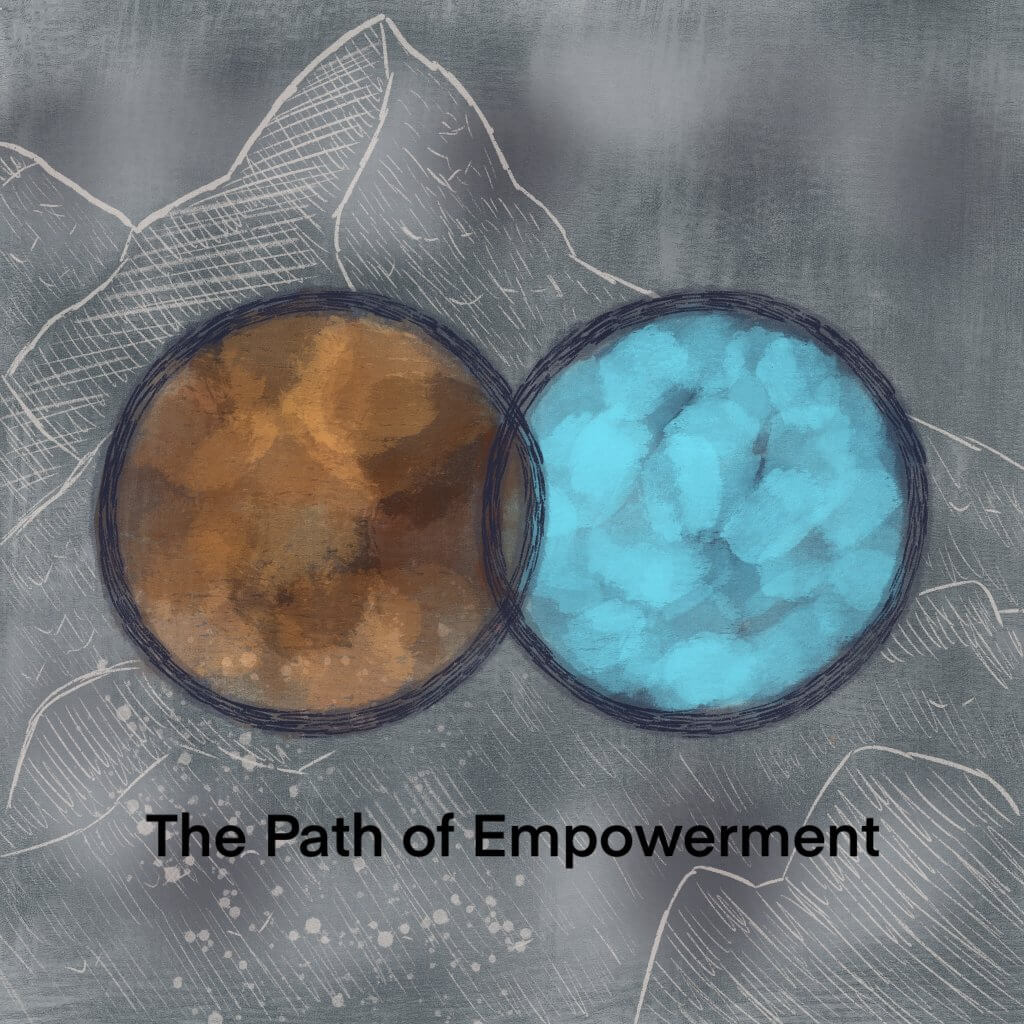for @threadapalooza 2024, i’ll share a thread of 100 tactics about how i approach various projects, little pieces of my playbook for being able to do badass projects with more joy, effectiveness, and impact!
1. insist on fun as a standard. U should enjoy ur work. is it fun? be honest about this.
if it’s not fun, say so to urself and ur collaborators—that’s the path to returning to having fun again.
2. consider adopting the word “funprofessional” into ur vocabulary. it means something that hits the optimal sweet spot between fun and professional, between joy and excellence. neither boring nor sloppy.
being funprofessional with my projects is my North Star
3. “hell yes or no” continues to be an excellent rule of thumb for me. if it’s not a hell yes, it’s a no.
4. “hell yes or no” also usefully applies to the collaborators U work with. if someone gives U a maybe, it can be useful to take that as a no, or to make it Urs.
5. it’s worth waiting for a collaboration where U and all ur collaborators are a “hell yes” to it.
there’s no feeling like it. the project will happen quickly, effectively, joyfully, and U’ll be astonished and delighted by what U all make together.
6. @fortelabs‘ idea of “mood-based productivity” is key to be joyfully generative today & for months + years to come. few tasks these days are truly urgent. do what brings U joy.
what mood are U in? what do U want right now? what would be easy to do? what would be enlivening?
7. a lot of power comes from standing for something good: having good, clear, wholesome intentions; committing to working on those intentions, putting effort into them; and demonstrating that effort for months and years.
8. money really isn’t the bottleneck.
U can do cool, fun, impactful projects for free or dirt-cheap, especially in the internet age. i’ve built my skills and made my bones doing things cheaply, with duct tape, before advancing to more expensive, complicated, ambitious projects.
9. when U start a project, write down a clear, short, accurate, playful, inspiring one sentence description of the project and its goal.
keep it in a place that it can easily be accessed, referred to by all collaborators.
10. discuss non-negotiables at the start of collaborative projects.
these may grow or clarify during a project, but U often know them at the start if U take time to look.
a lot of headaches and conflicts can be avoided by being clear about boundaries from the start.
11. too often, i see people jumping right into overly ambitious versions of projects, or long-term collaborative relationships without established mutual context, on the basis of vibes.
U can do that, and it may even work, but it will be harder than it needs to be.
12. as much as possible, do a small version of a project first.
if U are trying something new, or working with a new collaborator, do it small first.
a small project is free, low stakes & can be completed in a matter of hours or days, certainly less than a week.
13. after successfully doing the small version of a project, do it bigger. do a medium version.
a medium version takes a few weeks to a month; should have a small budget. should feel feasible for all parties, but a bit challenging.
14. only then, when U’ve done small and medium versions of a project, should U advance to doing a large version of the project.
build ur individual and collective capacity in a specific domain over time. work up to bigger and bigger versions of ur projects and ambitions.
15. over time, “do it bigger, do it better.”
if U do a similar project again, see if U can do it with higher standards for excellence, or at a larger scale, or both.
intentionally focusing on one of these with a specific project is often invaluable.
16. if U do it bigger, do it better repeatedly, with each and every project, trying new things and learning from them, U will grow ur capacity for doing projects over time.
17. play it like a video game, and let it get progressively harder over time, while ensuring U are having fun all along.
if it’s too easy, challenge urself.
if it’s too hard, ease up and do something a little simpler, more fun.
18. over time, bigger projects will be more fun for U and have a bigger impact. surprise urself with what’s possible.
if U grow with each completed project, with each passing month and year, U will become capable of things that astonish Urself and change the world
19. U can optimize for service project throughput: the rate at which U can complete projects, the amount of subjective / qualitative fun U have doing them, and the qualitative and quantitative benefit those projects have
20. at the end of a project, do a team debrief / retrospective. share in an honest and kind fashion, what went well, what was hard, what U’d do differently next time.
also make sure to take time to celebrate as a team!
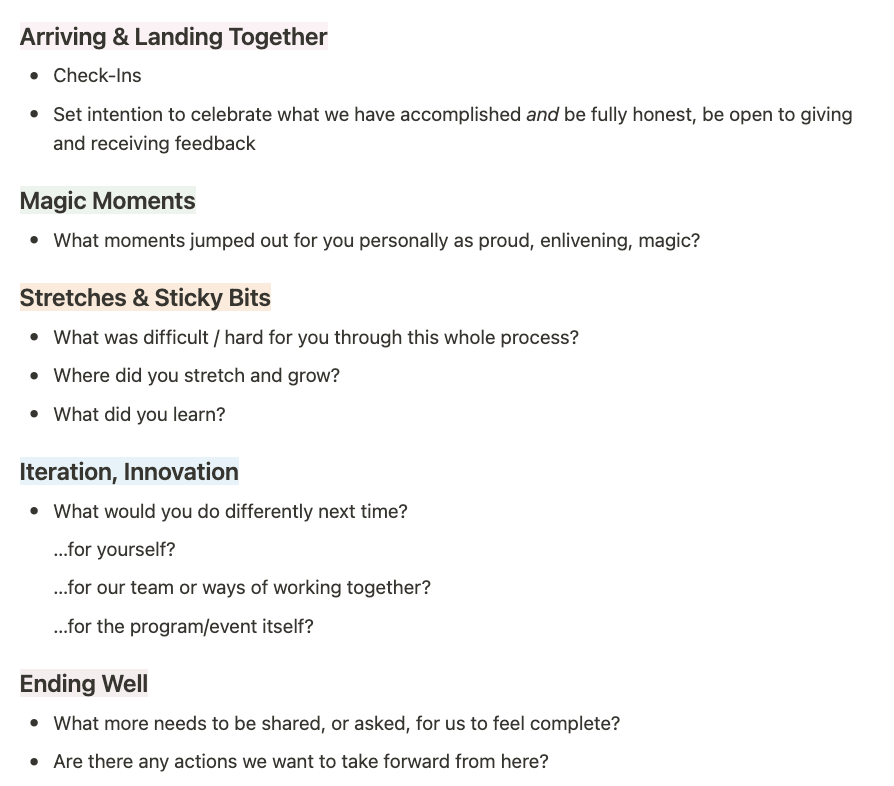
21. for complicated projects that U are doing for the first time, a pre-requisite tree (aka implementation tree) is invaluable for figuring out what needs to happen in what order, and what can happen next.
22. if U complete a complicated project that U are likely to do again, it’s worth taking the time to make an standard operating procedure (SOP) out of it.
23. standard operating procedures (SOP’s) are invaluable for excellent execution, especially in teams, but also even as an individual. they take a bit of theory and practice to get the hang of, but it’s worth it.
take 2m to watch the video in this post
24. to the extent that a project is complex, do multiple safe-to-fail experiments in parallel.
in other words, just try things. fuck around and find out. see what happens. keep doing what works, drop what doesn’t. rinse, repeat.
25. actually ship projects! always finish projects!
scope them such that it’s feasible that U can finish them, and do so! take the time to finish out & share past incomplete projects.
U’ll find energy freed up, new information flowing in. and sharing is how U benefit others!
26. with creative projects or new learning areas, have floor goals that are obviously feasible, and stretch goals that are inspiringly ambitious.
always make sure U hit ur floor goals, then aim for the stars and accomplish ur stretch goals.
27. imo, collaboration is a dual relationship. friendship first, friendship first, friendship first.
let the project be a way to deepen ur friendship.
if a collaboration is obstructing Ur ability to be friends with someone, wind down the project and focus on being friends.
28. pick collaborators whose company U enjoy, who U respect and admire, who U will be delighted to spend time with, who U can learn from and grow alongside, who U would be happy to have as friends
29. choose collaborators who U can trust from experience will to do what they say they will (DWYSYWD).
here are some loose signals for trustworthiness: they send calendar invites; come on time (or ping if late); write down tasks; write down notes; are proactive in following up.
30. there’s an art to inviting a potential collaborator into collaboration.
it ought to feel like receiving an invite to the coolest party ever.
U want it to feel like a guaranteed absolute hell yes. that requires theory of mind, anticipating their desires, goals, needs
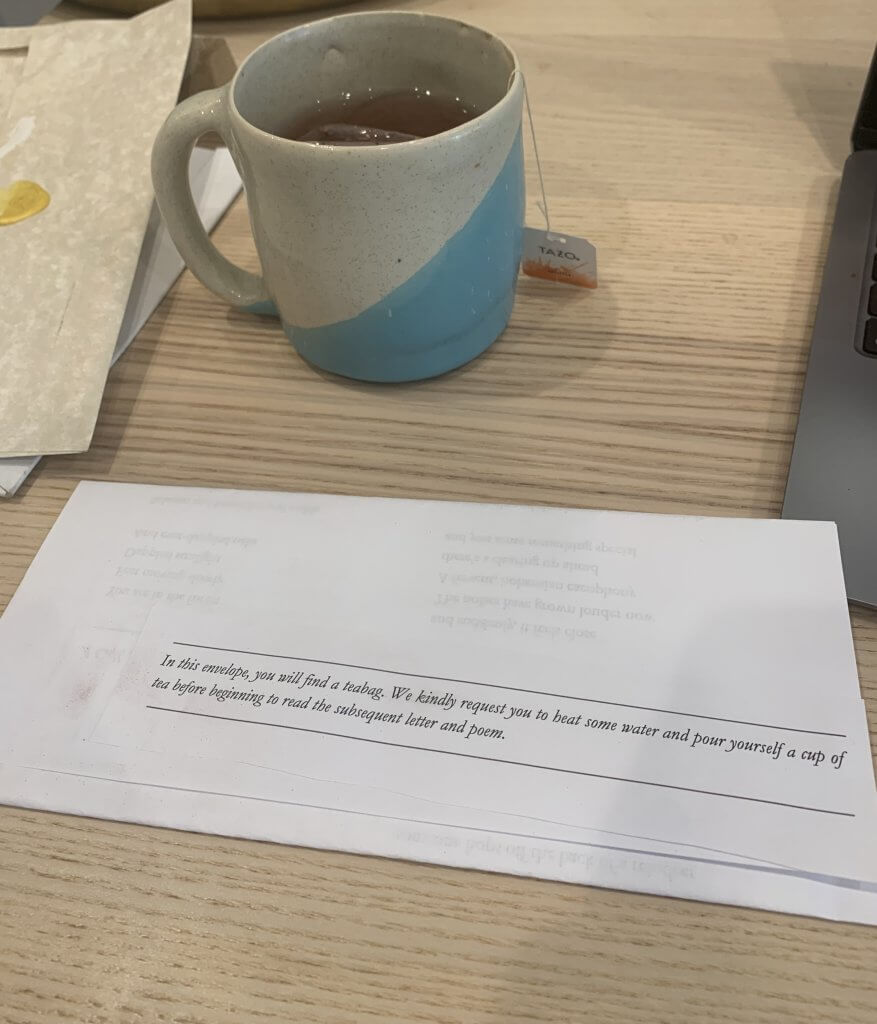
31. there are a number of variables that motivate people: $, status, meaning/purpose, skill development and internal growth, fun and enjoyment, friendship, working with cool people.
know which variables ur collaborative projects provide (and which they don’t)
32. believe in the people U collaborate with. help them at every opportunity U can, not just in ways that are related to ur collaboration. their happiness is ur happiness, their growth ur growth, their flourishing ur flourishing, their victory ur victory.
33. at the beginning of a collaborative project, assign clear roles as to who’s responsible for what aspect of the project. write down what that role is, and what they are responsible for.
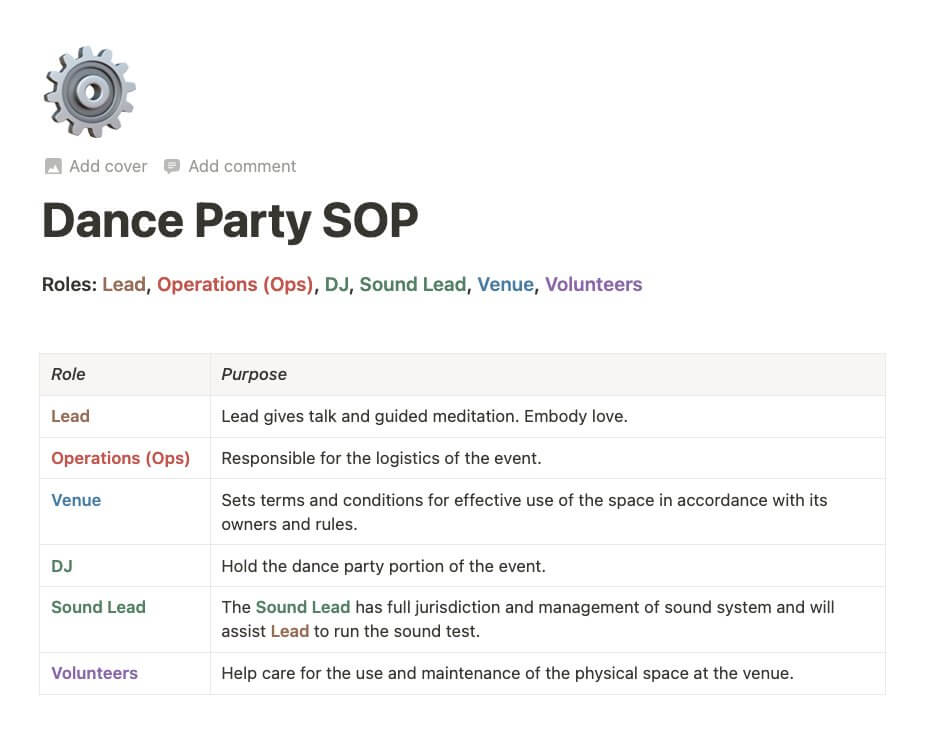
34. pick roles and projects for urself and others that will challenge everyone involved, help everyone to grow.
don’t just see the person as they are now, but who they are capable of becoming, what their goals and desires reveal them to be aiming for.
35. there are a number of specialized roles i’ve come to hold in my head. i think of them as Quest Classes.
this is just my own personal typology of collaborators, that i repeatedly find useful in my projects.
36. Vision Lead: collaborative projects work best if there is one person who is the head / source of the project. they hold the vision, know the purpose, hold all the context. if push comes to shove, it’s their call.
37. Ops: on complicated, long-term, multi-step projects, U are very likely going to want someone to manage logistics, to weigh tradeoffs, to manage the complicated state, help make tricky decisions.
38. Project Manager: on larger projects, with multiple stakeholders, it may be useful to have someone distinct from both the Vision Lead and the Ops person to coordinate people, manage the intersection of the people’s needs and the project operations.
39. Creatives: often, U will want one or more experts in specific mediums, with an artistic flair.
some Creatives I’ve worked with: visual artists, animators, vocalist, music producers.
40. Tech: a similar, but potentially distinct, role—an expert in a technical medium.
they also have a creative, artistic sense, but often there are established best practices, correct ways of doing things that they know well. e.g. a Sound Tech at a dance party.
41. Support People: in a similar way, there’s often one or more people who are not holding the vision or managing operations, but are beasts at executing on the tasks that need to be done.
42. some other roles I’ve found useful to deploy in specific contexts: a Marketing/Sales/Fundraising person, or a Mentor/Advisor/Muse.
43. if, on a collaborative project, there’s a conflict, defer to the relevant expert’s sense of things, their aesthetics, experience within their domain. for example, a visual artist should have final say on visual aesthetics, provided it doesn’t conflict with the overall vision.
44. it’s invaluable to have one or more people to share context with about long-term projects and ambitions that matter to both of U.
this is like a cofounder in a startup. even if U aren’t starting a company, U can build relationships like that!
45. small teams with a clear intent, shared purpose, clear division of roles and responsibilities, strong relationships can coordinate incredibly effectively, have an outsized impact. the whole can be greater than the sum of the parts
46. individual relationships outlast any project or work context. focus on the people, the relationships. treat people with respect and kindness, fairness. go the extra mile to help people. treat people the way U would want to be treated.
47. here are more thoughts from me on the best practices and ideas i’ve found for collaborating with others.
48. i insist on starting meetings with a check-in (emotional/psychological).
everyone’s coming in from different places, literally and metaphorically, and honoring where each individual by sharing their internal weather helps collective sensibilities and intelligence arise.
49. as much as possible, record ur meetings.
U may only revisit 1-10% of ur conversations but having a recording of those conversations will be invaluable, for reasons both expected and unexpected
50. never hold a meeting that doesn’t need to happen. cancel meetings where U don’t really have something to talk about. end meetings early when there’s nothing left to talk about. respect everyone’s time.
51. people feel safer, benefit more, and have a better time at events and meetings of all kind when there is a clear, well-held structure that matches its intention.
52. learn to leave zoom meetings smoothly. knowing the relevant keyboard shortcuts also works well here (⌘-W then Enter on Zoom for Mac)
53. if U have meetings with multiple people, where there’s a number of different, complicated threads to address in a limited time, make use of this trick: create a google doc, have everyone write down their thoughts and notes in parallel
54. on a solo project, U can get away with making decisions on the fly, fast and loose—on a collaborative project, share information, decisions, questions, challenges with ur collaborators as soon as possible.
memorize the phrase “who needs to know this now?” ask it often.
55. value being responsive. favor sending a shorter messages sooner: “yes!” “no!” “would Thursday work?” “let’s pick the red one!” “did U see their message?” time is precious and it’s often optimal to respond quickly. respect ur own time by keeping it short, not overthinking it.
56. become an uncertainty killer. communicate early and often to ur collaborators. even “nothing’s happened with x yet but we’re still planning on it” is a useful update (h/t @knipps, @dollarsanddata)
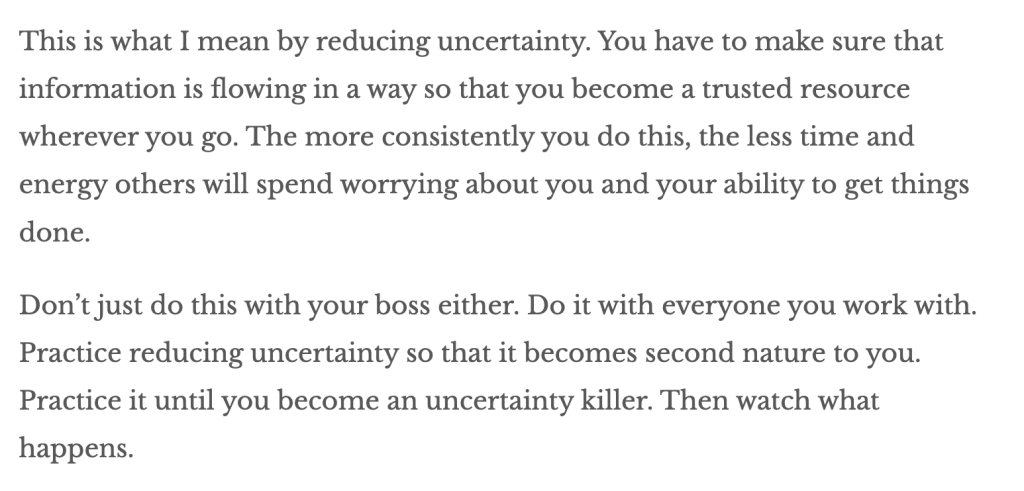
57. when asking for feedback on something U are creating, be specific about what kind of feedback U are seeking and let the people U ask know.
constructive feedback about a specific question? encouragement and positive feedback? it’s all good.

58. most conflicts can be debugged with honest, kind speech between two parties—but if U can’t seem to do that, bring in a trusted third party to notice the shared blind spots, help cultivate mutual understanding and resolution.
59. meet people U are interested in as early as possible. know that friendships and collaborative relationships can last years and decades. having a relationship in place early is one of those rare instances where just-in-case matters more than just-in-time
60. relatedly, try to be kind and fair in all ur dealings, both because it’s good in itself, and because U never know how the consequences of ur actions will impact U later on
61. when someone U are interested in starts following U, drop them a line.
keep it brief. be authentic, appreciative, heartfelt.
make it enjoyable, low-effort to reply and engage meaningfully. don’t burden them by asking them to to read a lot, or put in work to reply.
62. mutuality is valuable.
if U follow someone here or elsewhere, & they follow U back, treat that relationship with respect, treat them with kindness, help them when U can. when we are connected to someone, we have countless opportunities to help and be helped over the years
63. if U want to introduce two people, use double opt-in: check with them both separately that they are interested in and willing to meet the other.
make sure U think, feel confident it’s a win-win for both parties before U ask.
64. everyone knows what a friend is, what a collaborator is, a coworker, a boss, an employee, a lover, a husband or a wife. start thinking in terms of “allies,” also.
65. cultivate mutual situational awareness with ur allies. help ur allies to succeed and flourish at their goals, and let them help U succeed and flourish at urs. build mutually supportive feedback loops between their projects and urs.
66. make a website as soon as possible.
with ur own home on the web, U can reach the other 5.5 billion people+ on the internet.
keep it simple. stupid simple. simpler than U are thinking. if U can’t launch it today or this week, it’s too complicated.
67. buying ur own domain is affordable for most everyone and signals professionalism, that U care.
68. make a newsletter ASAP, too. set up Kit or MailChimp or what have U and just start collecting emails.
U don’t even need to send something out. just have them ready for when U want them, because U will—& launching something fun isn’t the time to start scrambling for emails.
69. when it comes to social media, ur own sanity, safety, and enjoyment are invaluable.
U and U alone can know if U feel happy and good about the way U are using it, and what U need to shift it so that U do. do whatever it takes to take care of urself
70. whenever a new social media platform launches or becomes popular, take 10 minutes to sign up for it and grab ur handle.
U don’t need to start posting—just have the account so U can use it if and when U want to, are ready to.
71. focus ur time and energy and effort on developing skill on one social media platform at a time—the one that’s most exciting, fun for U. once U are comfortable there, have a fair bit of content and an audience, U can add new ones.
72. YouTube lets U upload practically unlimited videos, for free. they also let U upload videos that are unlisted, which U can only see if U have the link. make use of this affordance! for as big as YouTube is, these functions are still underrated imo.
73. U can just turn on ur phone or laptop camera, record a video, start monologuing, and upload it raw and unedited. knowing Ur own thinking at a specific point in time will be so valuable to U personally, and it may very well help others, too.
74. U can make ur own custom YouTube playlists, and feature them on ur channel homepage. the playlists don’t have to include videos U made! this opens up a lot of possibilities
75. Patreon: people can’t support U if they don’t know U have a Patreon! mention U have a Patreon when it’s relevant, and often people will want to support U.
for example, i mention mine at the end of each blog post on my website.
76. i have a private document of advice i wish i knew when i’d started a Patreon that i’m happy to share with people who ask by DM or email.
77. it’s worth learning how to develop mutually supportive feedback loops between different projects and areas of Ur life.
think about what the inputs and outputs of ur projects are, what the those of other systems U interact with are.
78. this skill requires U to learn how to make the output of one system the input of another.
if U do that repeatedly, thoughtfully, carefully with as many inputs and outputs of ur systems as U can, they will become mutually supportive.
79. one practical way to do that is to add links between everything U do on the web. make a vast interconnecting web of links between all everything U create. pave the desire paths.
80. it’s always worth articulating to urself how U think about things. take notes on everything. document ur process. use a captain’s log/interstitial journaling. social journaling (feeds) is even better. share things in public as soon as possible, feels safe.
81. U can learn more about social journaling and feeds here
82. if U know U are going to write something, or might want to—a memo, blog post, or book—start a placeholder note or doc and start adding relevant things to it.
83. if part of ur process of creating something or executing a project involves multiple stages, especially going through them repeatedly, it’s worth clearly identifying those stages and the needed steps, documenting, optimizing them.
84. it’s worth writing a book, if only to articulate at length how U think about the things that matter most to U.
that clarity of intention is invaluable. sharing ur thinking with the world is a bonus
85. self-publishing a book is free and easy, and is a good, sane default for most writers.
publishing through traditional media/publishers has some advantages but should be chosen intentionally. tradeoffs.
86. have a code of conduct for any community U run in an ongoing way that is over 5-10 people. give urself a sign to tap if and when U need it.
here’s one of many available templates.
87. chatham house rule—where anyone can use information overheard but not attribute it to someone—is a stable, sane default for communication norms in semi-private communities
88. shared digital spaces like communities or organizational software should be kept tidy, up to date, and orderly, just like U would keep ur own home clean, welcoming, inviting to guests.
every space should have a purpose, and serve that purpose. people can feel ur care
89. Discord is great because it’s free to use and create communities, but its UI defaults are unintuitive and clunky for most people.
here are the things that make it usable and joyful for me.
90. making ur own illustrations and using them in ur creative projects is overpowered, because ur own heart and style and vibes come through more clearly than e.g. stock photos
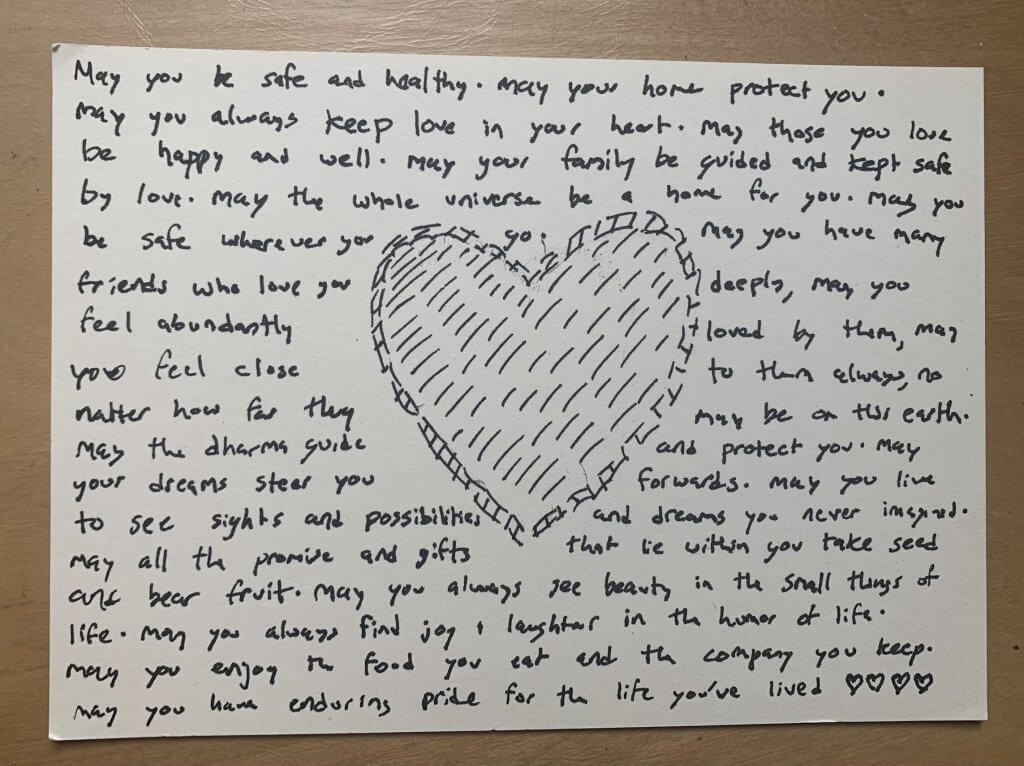
91. Procreate makes this possible for everyone with access to an iPad and an Apple Pencil.
learn a little digital drawing and see the benefits come through
92. similarly, using ur own photos and videos can be useful for countless reasons.
take lots of photos and videos and be surprised by how they come in handy over time!
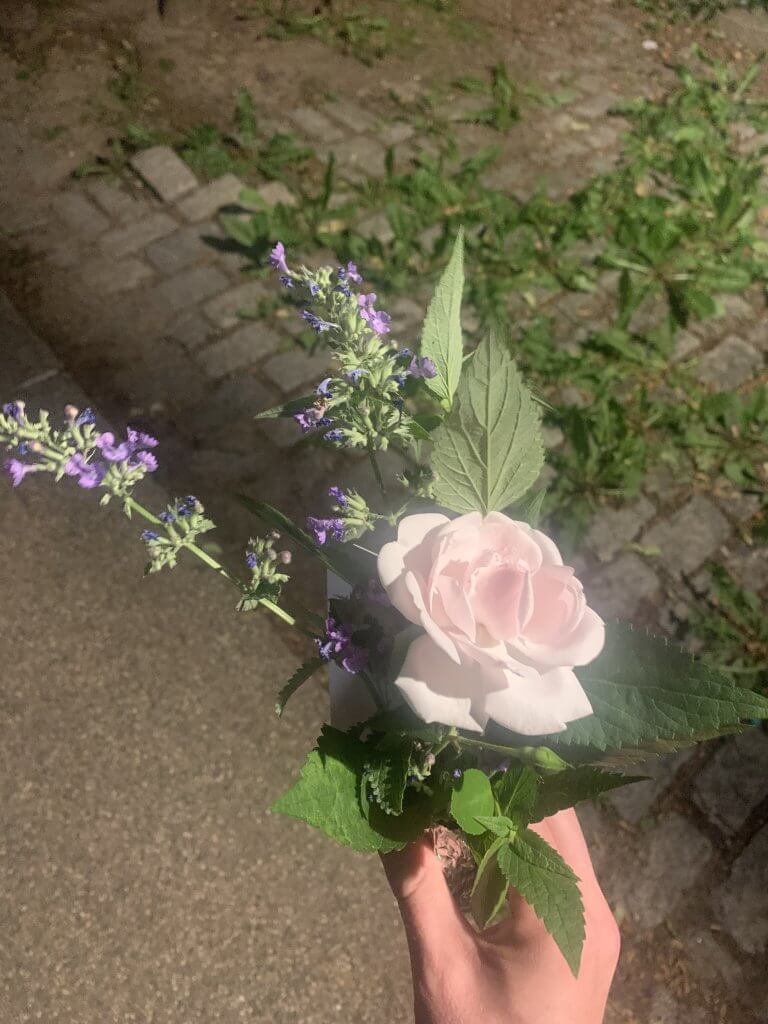
93. my current model of skill acquisition:
- learn the basics of a skill
- maintain that fundamental knowledge by using it
- deepen ur knowledge opportunistically, when U are interested, when it’s fun, when it’s useful and relevant.
- combine it with Ur other skills.
94. if U have a problem, consider having conversations about the problem. like, a lot of conversations.
talk to a lot of people about the problem. talk to a 100 people, 1,000 people about the problems, questions, topics U care about.
95. learn one, do one, teach one!
after U learn something, do it!
after U do it, teach it to someone else!
if U teach someone else, have them learn one, do one, teach one!
this helps the individual learner deepen their own knowledge and helps distribute it collectively
96. for any skill or project area that U care about, consider having teachers, coaches, mentors, advisors.
seek advice, support, knowledge, accountability from experienced, believable people that U vibe with, feel safe with, trust, look up to.
97. level up ur productivity skills, and make sure ur collaborators do, too.
make sure U have inbox zero, use calendars and task managers, take notes in a notes app.
if all the basics are in place for everyone U coordinate with, possibilities are limitless.
98. i’m biased because i made it (with @uberstuber), but the Digital Productivity Coach is an affordable, effective way for everyone to level up their productivity skills.
or U can read GTD & Tiago’s BASB book, review other materials from them
99. learn the art of fundraising.
knowing U can make nearly any project possible by sourcing the money for it changes the equation of what’s possible, what projects U can do, what scope and ambitions U can have, and how U feel about work overall
100. here’s a dedicated post with the strategy mental models and tools i’ve personally found most useful over the years
U might also enjoy reading the book I wrote on empowerment with my collaborator Mary Bajorek, The Path of Empowerment.
i hope U enjoyed this thread! ❤️
i’d love to hear what felt resonant or useful for U, or any questions U might have 🥰

